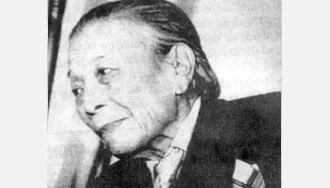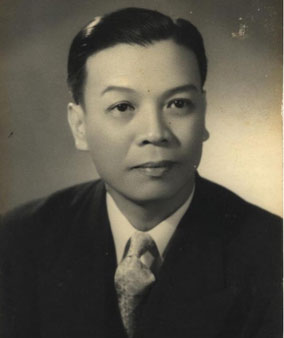

Professor Nguyen Manh Tuong (1909-1997)
I was not fortunate enough to be his student, nor did I ever meet Professor Nguyen Manh Tuong in person, but ever since officially becoming a member of the Foreign Literature department (I remember it was around September 1976, when the three groups of Russian, Chinese, and Western literature were still operating together in one department), his name and anecdotes have always been among my most fascinating and memorable experiences. My impression of him, as a "junior" in the field of teaching and researching foreign literature, was perhaps primarily due to his remarkable talent: at the age of 23, Nguyen Manh Tuong earned two French doctorates (and these were national doctorates – docteur d'État, not the modern doctorates – docteur nouveau that many people can achieve); his achievements were so brilliant that they surprised even the French at the time. Clement Vautel, a prominent conservative and nationalist commentator of the time, issued "warnings" in a French newspaper aboutphenomenaNguyen Manh Tuong said:The French should be careful: if the Vietnamese are given the opportunity to study and excel in their studies like this, will they be content to stay put when they return home??”. My second impression of Professor Nguyen Manh Tuong, which many others might not doubt, is his "arrogance," but to me, it was self-confidence, strength of character, and self-awareness, "I think this way, therefore I exist," as a 17th-century French philosopher asserted. Professor Tran Thanh Dam, a former student of the Faculty of Literature, recounted his teacher, Professor Nguyen Manh Tuong, as follows:When he taught us in Thieu Hoa, Thanh Hoa, he would occasionally say, "I'm truly a freak. Do you think I am a freak?" His students were bewildered, and he replied, "Who else is like me, earning two doctorates at the age of 23?" He said this with pride, and his students responded, "He's genuinely and innocently arrogant.""That's roughly it. The stories about Professor Nguyen Manh Tuong, as well as many other famous professors of the Hanoi University of Literature, have filled generations of our students with pride for many years to come. Indeed, it will be a long time, even if science advances by 'spacecraft,' I still believe that we will hardly be able to find another team of such talented and impressive scientists. Professor Nguyen Manh Tuong is one of those impressive professors."
Nguyen Manh Tuong was born on September 16, 1909, into a family of civil servants on Hang Dao Street, Hanoi. Actually, his ancestral home was in Co Nhue village, Tu Liem district. In short, his brief biography is as follows: As a child, he attended Paul Bert school, then continued to Albert Sarraul school. At the age of 26, he passed his philosophy baccalaureate with honors, thus receiving a scholarship to study in France. From 1927 to 1933, with his brilliant intelligence, Nguyen Manh Tuong made a miraculous leap: he successively completed bachelor's programs in law and literature, and then earned two doctorates in these two fields. Of course, Nguyen Manh Tuong's "miraculous leap" was not only due to his innate intelligence but also to his genuine dedication to his studies. He said:From the 6th grade to high school, I had a habit of reading two Western novels a week [...]; and especially due to hard work: for five long years, every morning I woke up at 4 a.m., studied and wrote until 8 a.m., then went to class, and in the afternoon I studied until late at night.In May 1932, he returned to Vietnam, but later went back to France, traveling and studying in several European countries (Spain, Italy, Egypt, Turkey, Greece). It wasn't until 1936 that he officially returned to Vietnam and participated in various activities: he was appointed to teach Western Literature, immediately after the establishment of the Faculty of Literature (1945); in 1946, he was appointed by President Ho Chi Minh to the delegation of the Government of the Democratic Republic of Vietnam to attend the preparatory conference in Da Lat. That same year, while attending a court session in Hai Phong, the nationwide resistance war broke out, and he immediately joined the resistance army: he went to the Viet Bac war zone, into inter-regions III and IV, and was appointed as a lawyer at military courts, high criminal courts, and a member of the Board of Directors of the preparatory university, then in Thanh Hoa and Nghe An. Despite this, Professor Nguyen Manh Tuong was unfortunately not well-off, perhaps due to the complex circumstances of the country's resistance war. The difficulties and opportunities available to a well-trained intellectual like him, allowing him to contribute, were truly limited. Furthermore, his career path at the University at that time was very short, lasting only about three years, from 1954 to 1957, in the roles of director of the law faculty and deputy director of the pedagogical faculty. Around October 1957, due to a professional "accident," he permanently left the university teaching profession. It wasn't until 1994, after a long period of interruption, that Nguyen Manh Tuong had the opportunity to return to his familiar professional work: participating in the compilation and publication of several works in both literature and education. Three works in total.European educational theories of the 16th, 17th, and 18th centuries, from Erasmus to Rousseau.(Education Publishing House, 1994)Eschyl and Ancient Greek Tragedy(Education Publishing House, 1994)Viergile and Latin epic(Social Sciences Publishing House, 1996) can be considered representative of his work. More comprehensively, Nguyen Manh Tuong's career comprises 18 books, including translations, research, and original works in both Vietnamese and French, covering the fields of literature, law, and education. Most of the books written in French have not yet been published, even in France. Among those unpublished books, as far as I know, is a collection of lecture notes printed using a mimeograph machine.Western Renaissance culture and literature(It is still preserved at the Literature Department's archives). Unfortunately, until now, it has only existed internally. Given such a somewhat fragmented biography and career, and the fact that opinions about him are still not entirely consistent, reconstructing a complete and accurate portrait of him is very difficult for someone like me, a "later generation," to achieve. However, I would still like to humbly offer a few sketches of this incomplete portrait of Professor Nguyen Manh Tuong. Hopefully, in the future, the missing parts of this portrait will be filled in.

Professor Nguyen Manh Tuong in his youth. He received two doctorates: Literature and Law, at the age of 23.
How should we objectively and fairly assess the portrait of Nguyen Manh Tuong – “the professor with two doctorates”? First, I would like to affirm that, regardless of differing opinions about him,in terms of humanHe was completely sincere, honest, and passionate. On the other hand, as a citizen, Nguyen Manh Tuong was also someone who always cared about the development and progress of the nation and the country. French historian George Boudarel, in an article about him, rightly affirmed that: “Although he greatly admired Paris and France (it could hardly be more so), at the decisive moment, Nguyen Manh Tuong, deep in his soul, remained Vietnamese. It seems he thought he was only loyal to the ideals forged in Paris: independence, freedom, human rights, and civil rights. In 1945, along with the entire elite of the nation, he followed the government of Ho Chi Minh.”
Regarding his scientific career, it is regrettable that, since returning to Vietnam, due to the circumstances of the war, his work has been frequently interrupted, and most of Nguyen Manh Tuong's works and writings in French could not be published. What we, contemporary and future Vietnamese, have had the opportunity to access consists only of four books published in Vietnam (in Vietnamese) from around 1994 to 1996. This is insufficient to fully assess Professor Nguyen Manh Tuong's contributions to the national science. Furthermore, the "intellectual treasure" of this professor with two doctorates is "scattered," spreading across too many fields: literature and law, philosophy and education, research and writing, compilation and translation... making it difficult to achieve a deep and comprehensive understanding in any single field. I believe that evaluating him from both perspectives—highly praising him to the point of being "superhuman" and completely rejecting his work—is unconvincing. It is true that at a time when Vietnamese higher education was still relatively inexperienced and lacked achievements (the 1940s), it was extremely regrettable that a well-trained talent like Nguyen Manh Tuong was not "fully utilized." However, even knowing this, we must acknowledge that this "extremely regrettable" situation is partly the fault of history. And history sometimes has its own "reasons." At this point, we shouldn't dwell too much on the "right and wrong" debate. We can only affirm one thing for certain: after 70 years since the founding of the Faculty of Literature, Professor Nguyen Manh Tuong, with his two doctorates, as well as many generations of talented professors who contributed to the school's reputation, will forever remain a source of pride for many generations of teachers and students of the Faculty of Literature, including myself.
|
PROFESSOR NGUYEN MANH TUONG
European educational theories of the 16th, 17th, and 18th centuries, from Erasmus to Rousseau., Social Sciences Publishing House, Hanoi, 1994. Eschylus and Ancient Greek Tragedy, Education Publishing House, Hanoi, 1996. Viergile and Latin epic, Social Sciences Publishing House, Hanoi, 1996. Essai sur la valeur dramatique du théâter d'Alfred Musset(A Study of Dramatic Value in d'Alfred Muset's Plays), Doctoral dissertation in literature, 1932, in original French. L'individu dans la vieille cite annamite(Individuals in ancient Vietnamese society), doctoral dissertation in philosophy, 1932, in French in the original. |
Author:Tran Hinh